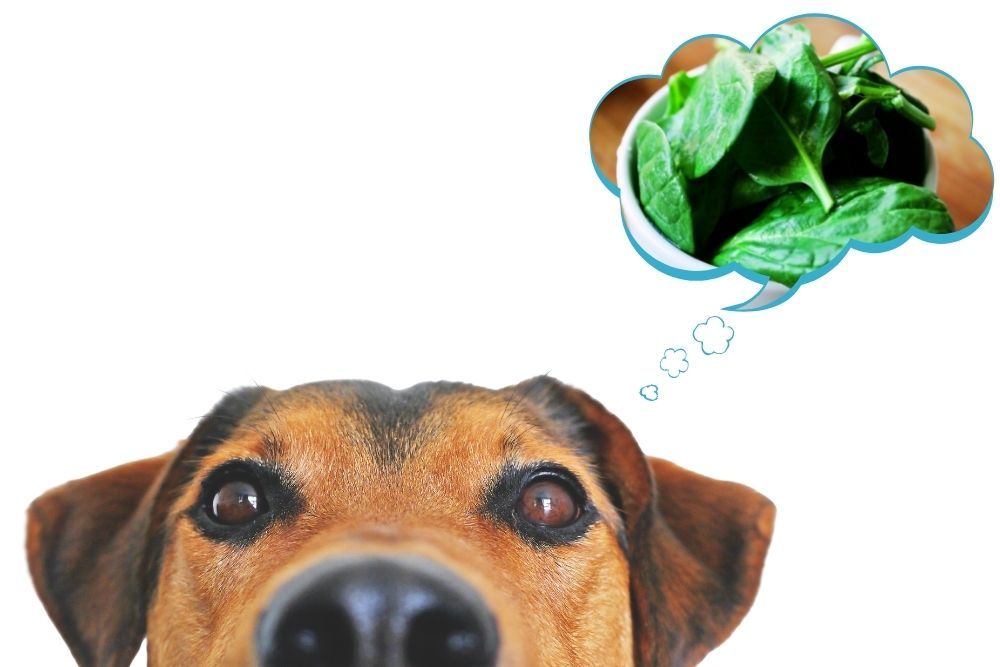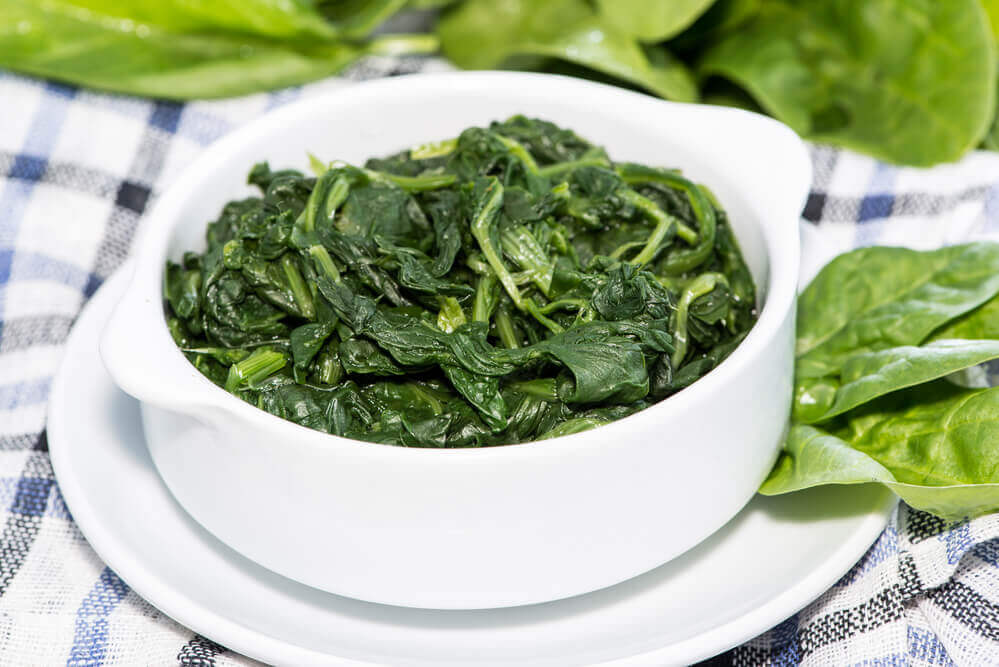A superfood loaded with minerals and vitamins – something you likely know already. But is it the same for dogs?
As it turns out, it is! Spinach is 100% safe for consumption by your canine friend and provides pretty much the same benefits that it provides to humans. Mainly, spinach protects dogs from the effects of aging and helps them lead healthier lives.
Note: Spinach is not good for dogs with kidney or heart disease. The high oxalates and sodium content in spinach can be detrimental to such dogs. More on this later.
The best part about spinach is that you only need to add 1-3 tablespoons of chopped spinach to your dog’s favorite food to provide all of its benefits.
So let's get answering to everything you need to know about spinach and dogs.
Take Note: If your dog has eaten spinach and he is acting abnormally or suffering allergy-like symptoms, be sure to consult with your veterinarian.
Nutritional Benefits of Spinach

Spinach is a superfood for us, and a superfood for your doggo.
Spinach is a leafy vegetable loaded with nutrients.
- Rich in many minerals including potassium, it can help lower blood pressure.
- Spinach also has a hefty dose of lutein – an antioxidant that protects against macular degeneration, cataracts, and other age-related eye diseases. Lutein deficiency can cause vision impairment and even blindness.
- Spinach also helps in the preservation of cognitive abilities as you age. This is also attributed to lutein. Benefits of lutein are sensed across memory, reasoning ability, verbal fluency, and processing speed.
- Packed with Vitamin K, spinach also aids in upkeeping bone health. In fact, just a small amount of spinach is sufficient to fulfill the daily Vitamin K recommended dose in all animals including humans, not just dogs!
- Vitamin A in spinach helps in the growth of tissues, including the skin. It also helps improve the immune system.
- Spinach is a good source of iron as well. Iron helps the body make hemoglobin which transports oxygen from the lungs to every cell. Eating spinach keeps blood health optimal.
There are more benefits of the nutrients and micro-minerals present in spinach but the vast majority of them are sort of like the default advantages of consuming any leafy green on the face of the earth, pretty much.
The significant components in spinach and how they help can be surmised in the above-mentioned points.
Can Dogs Eat Spinach? Raw or Cooked?
Yes. Dogs can have spinach as long as they are not suffering from kidney or heart diseases. Dogs, however, cannot process leafy vegetables the way we can.
Consequently, there is a specific way to prepare spinach for your dog.
- Raw spinach is hard to digest for a dog
- Boiled spinach is easy to digest but loses the majority of spinach’s original benefits.
- Gently steamed or blanched (cooked for a small amount of time) and without seasoning is the best way to feed spinach to your dog.
Evenly steam the spinach and chop it into fine pieces. Don’t add anything else like spices, salt, oil, herbs, onion, or garlic. Mix it with your dog’s favorite food and you are good to go.
Evenly steam the spinach and chop it into fine pieces. Don’t add anything else like spices, salt, oil, herbs, onion, or garlic. Mix it with your dog’s favorite food and you are good to go.
Is Spinach Good For Dogs?

Spinach may help combat cancer in animals. This is due to the high levels of vitamins, minerals, antioxidants, phytonutrients and omega 3.
Spinach is a low-calorie superfood that contains a plethora of amazing nutrients as well as antioxidants that any canine needs. Let’s look at the top 9 benefits of spinach specifically for dogs.
1.Immune system: Spinach includes powerful antioxidants in the form of vitamins C and E. This helps bolster the dog’s immune system.
2. Inflammation: Antioxidants also help reduce inflammation.
3. Vision and brain activity: Vitamins C and E protect the brain from cognitive damage with age. Vitamin A and beta-carotene support a dog’s vision.
4. Cell growth: Folate or vitamin B9 supports red cell production and consequently, aids in healthy cell growth.
5. Blood clotting: Spinach also includes vitamin K which is vital for blood clotting.
6. Internal functions: Spinach contains many trace minerals such as magnesium, manganese, copper, iron, and potassium that aid in cell function, fluid balance, nervous system health, and muscle contraction. These minerals additionally help in improving the dog’s skeletal structure.
7. Good gut bacteria: Spinach’s soluble fiber components dissolve in water and form a gel that lowers bad cholesterol and blood sugars in dogs while providing enough fuel for the growth of good gut bacteria. These fibers include nitrates, kaempferol, quercetin, chlorophyll, lutein, and zeaxanthin.
8. All of these soluble fibers also decrease the risk of cancer, heart disease, chronic diseases, infections, inflammation, and oxidation damage.
9. Improved digestion: Insoluble fiber content helps carry waste through the digestive tracts, thus improving digestion. Fibers also make your dog feel full with lesser calories, aiding in weight management.
The antioxidant content alone can help your dog fight the effects of aging such as inflammation, the weakening of the immune system, cognitive effects, and even help prevent cancers.
These fight the free radicals that can cause a lot of damage over time to various organs and systems within a canine’s body.
A 2014 study published in the Journal of the Federation of American Societies for Experimental Biology found that a diet with spinach (and other antioxidant-rich foods) improved health in aging dogs by enhancing circulating markers.
A study performed at Purdue University back in 2005 showed benefits of adding vegetables to meals for Scottish Terriers.
Data showed that dogs which consumed vegetables, specifically yellow-orange and green vegetables, at least 3 times per week were associated with a 70% reduced risk of developing Transitional Cell Carcinoma (TCC) of the bladder or urethra.
Spinach Dog Treats

Spinach is a great source of Vitamin A, K, and C. Adding it to a dog smoothie or a dog treat is a great way to add spinach to your pet's diet. Photo Credit: @nekos_to_inu
Another great way to serve this superfood to your dog are frozen dog treats made with spinach and other fruits and veggies of your choice.
Here's a simple recipe you can make at home.
What You'll Need:
- 2 cups Baby Spinach (cleaned)
- 1 Banana
- 1 cup Water
- 2 cups Green Apples or Pears (pealed and chopped into 1" pieces)
- 1 cup Celery (cleaned and chopped into 1" pieces)
- 1 tsp Fresh Ginger (pealed and finely chopped)
- ¼ cup plain Greek yogurt
- Ice (optional)
- Blender or Food processor
- Molds
How To Make It
- Clean and chop all your fruit and veggies.
- Add your spinach and water and blend.
- Add all your fruit and veggies and blend.
- Add yogurt and blend until smooth.
- Pour liquid into silicone mold or ice cube tray.
- Freeze for a couple of hours or overnight.
Feed 1 ice cube or 1 bone-shaped serving per 30lbs of body weight a day.
Known Side Effects of Spinach in Dogs with Kidney or Heart complications
There are a couple of scenarios where spinach should be avoided at all costs.
Dogs with kidney complications or urinary tract issues
Spinach contains high amounts of oxalic acid. Oxalates can disrupt a dog’s metabolism.
High oxalate levels can create calcium oxalate crystals. These crystals reduce overall levels of calcium in the dog’s body while also reducing calcium absorption from other sources.
Apart from that, oxalates can also build up in the kidneys. Too much oxalate buildup can contribute to the formation of kidney or bladder stones. This can cause kidney failure and even death.
Muscle weakness, respiratory paralysis, kidney stones, or an abnormal heartbeat are all signs of a complication that can worsen with the intake of spinach.
Dogs with heart complications
Spinach contains high amounts of sodium. Sodium alleviates kidney issues as well, but more importantly, it can cause heart problems to grow in their seriousness. Avoid feeding spinach to dogs with heart issues/disease.
Can Puppies Eat Spinach?

How to serve: Blanched (cooked for a small-time) or steamed spinach without any seasoning is the best way to serve it to your pet.
Yes, puppies can eat spinach safely. You can reduce the amount given to a puppy but that’s about it.
However, note that too much spinach can result in heavy oxalate buildup. As a puppy’s kidneys are still forming, they can sometimes not take the load. You first need to get your puppy checked by a vet to ensure that its kidney can digest the spinach. If it cannot, avoid it for the time being. If it can, you are in the clear.
Dogs of all breeds and ages can safely consume spinach as long as they don’t have heart or kidney complications. It just depends on how well you prepare it for them.
Some puppies might be overly picky. Let’s face it, the smell of spinach alone isn’t nearly enough to make pups go crazy. If you are having difficulty feeding spinach to your puppies, then you need to find smarter ways to mix it with what they love.
If nothing works, your last bet is to mix boiled spinach for limited benefits and gradually transition to steamed spinach as your pups learn to expect a hint of the superfood.
Spinach for Dogs FAQs
Here are some common questions that dog owners generally have regarding spinach.
What happens if my dog eats spinach?
It would take a lot of spinach to make a dog sick. In that, spinach is not different from other vegetables that have small amounts of oxalates.
Can long-term consumption of spinach cause problems?
Sources tend to agree that long-term consumption of a hefty dose of spinach can cause problems in the kidneys of dogs. Ask your vet if in doubt regarding the quantities that your dog can handle.
How much spinach is safe and healthy?
Generally, 1-3 tablespoons a day would suffice. You can also give 2 tablespoons every alternating day.
Can spinach cause diarrhea in dogs?
Consuming a gigantic amount of spinach in one go can upset the stomach and might lead to vomiting and diarrhea.
So, Is Spinach Safe for Dogs?
Ultimately, we can conclude that spinach is completely safe for dogs of all types, breeds, sizes, and ages as long as there is no kidney or heart disease involved.
Spinach is not known to cause any other problem in canines. There is not sufficient research into the exact impact of spinach on dogs because it simply isn’t needed. It is pretty much a given that spinach, as a superfood, is great for dogs in general.
All in all, we highly recommend adding a dash of spinach after steaming and chopping in the favorite food of your dog. Over the long run, it will lead to abundant health benefits and help your four-legged friend fight the signs of aging better later on.



